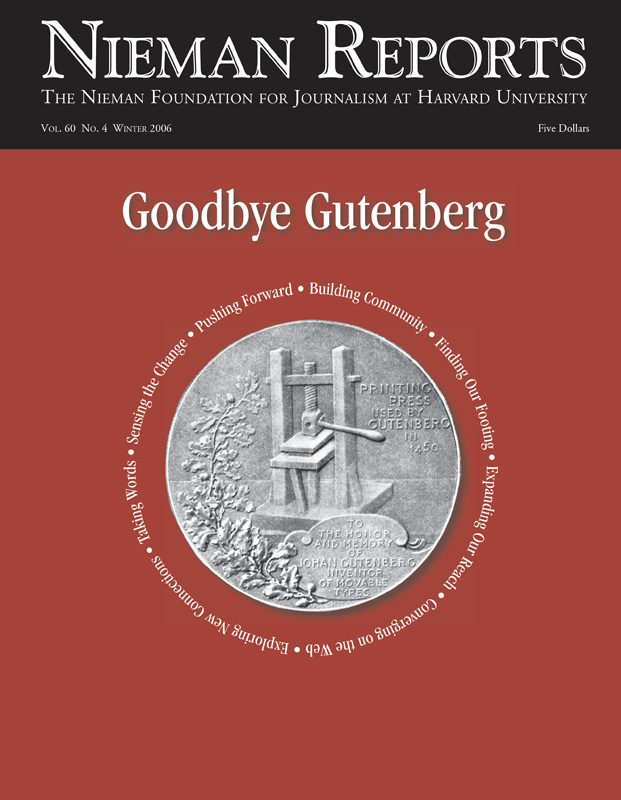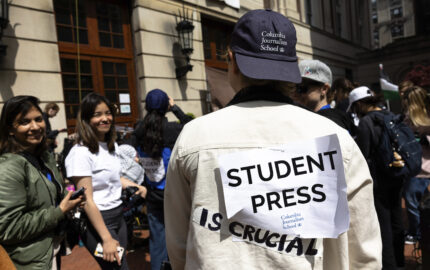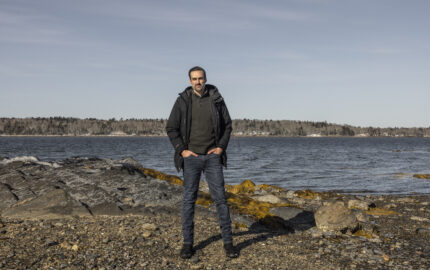
Goodbye Gutenberg
Journalism is on a fast-paced, transformative journey, its destination still unknown. That the Web and other media technologies are affecting mightily the practice of journalism is beyond dispute. Less clear is any shared vision of what the future holds.
In this issue, words about journalists' experiences in the digital era transport our vision forward, while our eye takes us on a visual voyage back to a time when newspapers wove communities together.
Last summer, on a glorious morning in Manhattan, I was sitting on Jimmy Breslin's deck, 16 stories above the Upper West Side, bitching and moaning about how much the newspaper business has changed. As I whined, Breslin almost snorted coffee through his nose.
"Business?" he asked, incredulously.
He put his mug down and waved his hand at me, dismissively. "The business," Breslin said, "is gone."
Sometimes, it feels that way. The newspaper game my generation got into 25 years ago has changed dramatically. At many papers, circulation is falling, and the money growing on classified trees that let us do just about anything is gone. The bean counters are everywhere. Consultants tell us what news is. We click onto Romenesko every day, checking not for tips on how to do our jobs better but to see who else is getting bought out or laid off. There are fewer reporters and too many editors who seem to think it's their job to suck the life out of copy, lest we be accused of bias or pride. Getting a story into the paper simply because it's a good read is so much harder than it used to be.
What the hell happened?
"They took all the fun out," Breslin said, nodding sagely. But as he'd be the first to admit, maybe he and the rest of us who think journalism is supposed to be fun at the same time it's being important are just dinosaurs. And, like dinosaurs, if you don't adapt, you die.
Trying desperately to adapt, a little more than a month after that cup of coffee I took my first assignment as a blogger. For reasons still unclear to me, the Goethe-Institut, a German cultural organization, asked me to be the U.S. correspondent for a Weblog they set up to chronicle the World Cup matches in Germany. And so I found myself sitting in an English pub in Sarasota, Florida with my 12-year-old son, Patrick, about to watch England play Portugal. There are more British people living in Florida than in any other place outside of Britain and, if you have to ask why, then you've never felt the lashing rain of Blackpool, Manchester or London on your face.
I was based in London for several years, and in the course of living there Patrick became a devoted England supporter, much to the chagrin of our Irish friends in Dublin, my previous posting. The English team is to soccer what my beloved Boston Red Sox are to baseball. True, they did capture the World Cup in 1966, just as the Red Sox won the World Series in 2004. But, historically, like the Red Sox, England loses big games and loses them in such spectacular, heartbreaking fashion that their failures are far more memorable than their successes.
I decamped to Tony Middlemiss's sports pub, Champions, fully expecting to chronicle yet another excruciating loss by England. I was on vacation and initially thought only of filing a blog entry, but decided to pitch a story to Joe Sullivan, The Boston Globe sports editor. Joe, who's a pleasure to do business with because he encourages creative writing, signed on quickly, intrigued by the idea of all these sun-worshipping ex-pat Brits crammed into a Florida bar in the middle of the day. He saw the piece as a sidebar, part of a package with stories filed from Germany by Frank Dell'Apa, our soccer writer, and John Powers, one of the nation's finest newspaper writers of sport and anything else.
Tony and his wife, Joy, had opened their sports pub in the middle of a Sarasota strip mall less than two years earlier, after arriving from their native Newcastle. Like many Geordies, they are warm and welcoming, and Tony took an immediate shine to Patrick, who was wearing an England jersey. But not for nothing is Newcastle's most famous musician named Sting. The Geordies, like all the English, know pain when it comes to losing on the soccer pitch.
When, in the 62nd minute, England's talented but impetuous striker Wayne Rooney kicked a Portugal player where it hurts and received a red card, there was a collective groan in Champions. The young yelped, and their elders recalled when a young, immature David Beckham delivered a similarly ill-timed kick to an Argentine that resulted in a red card that precipitated an England loss on penalty kicks in 1998. This had all the makings of a preordained, Shakespearean tragedy: the English, down a man, kept missing scoring chances and a coy, calculating Portugal side seemed determined to have the game decided on penalty kicks after overtime.
Almost inevitably, it came to penalty kicks and, predictably, England lost, and the crowd at Champions cursed and cried and ordered more pints of Newkie Brown Ale to drown their sorrows. Patrick and I drove back to our rented condo, and in less than an hour I'd written and filed my Globe story and sent off a similar version to the blog. The blog took me about 10 minutes to write, a task made easier because I'd already hashed out themes and transitions. But after I realized how easy it was to write for the blog, I thought that maybe I should have done it the other way around.
Later, the sports copy desk called to say I needed to trim the piece. Space was tighter than expected. So I began doing what I increasingly find myself doing as the years go by and the news hole, in its inverse relationship with my waistline, grows smaller and smaller. I chopped and cut, agonizing about what words, what quotes, what transitions had to go to make the damn thing fit. All the while, my blog entry circulated in cyberspace, being read by Germans, and who knows who else reads such things.
The next day, I compared my words that had gotten into the paper with what I wrote for the blog. The blog entry seemed better than the newspaper story. It wasn't much longer, maybe by 300 to 400 words, but those extra words contained some good quotes, some stylistic segues, and a little more color. It was, without a doubt, a better read. Unencumbered by the need to squeeze words into a finite space, the Internet proved better for me, as the writer, and I'd argue for readers, too, than newsprint.
Now if the bean counters could only figure out how to make enough advertising dollars off this stuff, we'd be all set.
A few days later, I called Breslin, making plans to meet up with him and his wife, Ronnie, at the Cape Cod premier of his 9/11 play-in-progress, "Love Lasts on Myrtle Avenue."
"So whaddya doin?" Breslin goes. "You workin on any good stories?"
I told him I was writing a blog and that it was better than writing for the paper.
"Blog?" Breslin growled. "Sounds like a (expletive) monster."
Could be, Jimmy. Could be.
Kevin Cullen, a 2003 Nieman Fellow, is a projects reporter for The Boston Globe.
"Business?" he asked, incredulously.
He put his mug down and waved his hand at me, dismissively. "The business," Breslin said, "is gone."
Sometimes, it feels that way. The newspaper game my generation got into 25 years ago has changed dramatically. At many papers, circulation is falling, and the money growing on classified trees that let us do just about anything is gone. The bean counters are everywhere. Consultants tell us what news is. We click onto Romenesko every day, checking not for tips on how to do our jobs better but to see who else is getting bought out or laid off. There are fewer reporters and too many editors who seem to think it's their job to suck the life out of copy, lest we be accused of bias or pride. Getting a story into the paper simply because it's a good read is so much harder than it used to be.
What the hell happened?
"They took all the fun out," Breslin said, nodding sagely. But as he'd be the first to admit, maybe he and the rest of us who think journalism is supposed to be fun at the same time it's being important are just dinosaurs. And, like dinosaurs, if you don't adapt, you die.
Trying desperately to adapt, a little more than a month after that cup of coffee I took my first assignment as a blogger. For reasons still unclear to me, the Goethe-Institut, a German cultural organization, asked me to be the U.S. correspondent for a Weblog they set up to chronicle the World Cup matches in Germany. And so I found myself sitting in an English pub in Sarasota, Florida with my 12-year-old son, Patrick, about to watch England play Portugal. There are more British people living in Florida than in any other place outside of Britain and, if you have to ask why, then you've never felt the lashing rain of Blackpool, Manchester or London on your face.
I was based in London for several years, and in the course of living there Patrick became a devoted England supporter, much to the chagrin of our Irish friends in Dublin, my previous posting. The English team is to soccer what my beloved Boston Red Sox are to baseball. True, they did capture the World Cup in 1966, just as the Red Sox won the World Series in 2004. But, historically, like the Red Sox, England loses big games and loses them in such spectacular, heartbreaking fashion that their failures are far more memorable than their successes.
I decamped to Tony Middlemiss's sports pub, Champions, fully expecting to chronicle yet another excruciating loss by England. I was on vacation and initially thought only of filing a blog entry, but decided to pitch a story to Joe Sullivan, The Boston Globe sports editor. Joe, who's a pleasure to do business with because he encourages creative writing, signed on quickly, intrigued by the idea of all these sun-worshipping ex-pat Brits crammed into a Florida bar in the middle of the day. He saw the piece as a sidebar, part of a package with stories filed from Germany by Frank Dell'Apa, our soccer writer, and John Powers, one of the nation's finest newspaper writers of sport and anything else.
Tony and his wife, Joy, had opened their sports pub in the middle of a Sarasota strip mall less than two years earlier, after arriving from their native Newcastle. Like many Geordies, they are warm and welcoming, and Tony took an immediate shine to Patrick, who was wearing an England jersey. But not for nothing is Newcastle's most famous musician named Sting. The Geordies, like all the English, know pain when it comes to losing on the soccer pitch.
When, in the 62nd minute, England's talented but impetuous striker Wayne Rooney kicked a Portugal player where it hurts and received a red card, there was a collective groan in Champions. The young yelped, and their elders recalled when a young, immature David Beckham delivered a similarly ill-timed kick to an Argentine that resulted in a red card that precipitated an England loss on penalty kicks in 1998. This had all the makings of a preordained, Shakespearean tragedy: the English, down a man, kept missing scoring chances and a coy, calculating Portugal side seemed determined to have the game decided on penalty kicks after overtime.
Almost inevitably, it came to penalty kicks and, predictably, England lost, and the crowd at Champions cursed and cried and ordered more pints of Newkie Brown Ale to drown their sorrows. Patrick and I drove back to our rented condo, and in less than an hour I'd written and filed my Globe story and sent off a similar version to the blog. The blog took me about 10 minutes to write, a task made easier because I'd already hashed out themes and transitions. But after I realized how easy it was to write for the blog, I thought that maybe I should have done it the other way around.
Later, the sports copy desk called to say I needed to trim the piece. Space was tighter than expected. So I began doing what I increasingly find myself doing as the years go by and the news hole, in its inverse relationship with my waistline, grows smaller and smaller. I chopped and cut, agonizing about what words, what quotes, what transitions had to go to make the damn thing fit. All the while, my blog entry circulated in cyberspace, being read by Germans, and who knows who else reads such things.
The next day, I compared my words that had gotten into the paper with what I wrote for the blog. The blog entry seemed better than the newspaper story. It wasn't much longer, maybe by 300 to 400 words, but those extra words contained some good quotes, some stylistic segues, and a little more color. It was, without a doubt, a better read. Unencumbered by the need to squeeze words into a finite space, the Internet proved better for me, as the writer, and I'd argue for readers, too, than newsprint.
Now if the bean counters could only figure out how to make enough advertising dollars off this stuff, we'd be all set.
A few days later, I called Breslin, making plans to meet up with him and his wife, Ronnie, at the Cape Cod premier of his 9/11 play-in-progress, "Love Lasts on Myrtle Avenue."
"So whaddya doin?" Breslin goes. "You workin on any good stories?"
I told him I was writing a blog and that it was better than writing for the paper.
"Blog?" Breslin growled. "Sounds like a (expletive) monster."
Could be, Jimmy. Could be.
Kevin Cullen, a 2003 Nieman Fellow, is a projects reporter for The Boston Globe.


